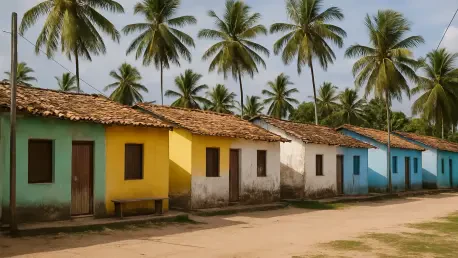In a world where affordable housing remains a significant challenge for many, especially for migrants starting anew in a foreign land, stories of success can serve as a beacon of hope and practical guidance for those in need. A Cuban expatriate living in Brazil has captured the attention of many by sharing an inspiring account of securing a remarkably low-cost rental in the city of Curitiba. Paying just 550 reais per month, this individual has not only managed to find a place to call home but has also taken to social media to offer valuable advice for others in similar situations. The tips provided focus on navigating the Brazilian rental market with efficiency and cost-effectiveness, shedding light on strategies that could benefit countless newcomers. This revelation comes at a time when migration to Brazil from various countries continues to rise, driven by job opportunities and community networks. The insights shared by this expat highlight a pathway to stability for those looking to settle in a new environment.
1. Navigating Documentation and Location Choices
Finding an affordable rental in Brazil begins with ensuring all necessary documentation is in order, a critical step for any migrant aiming to secure a legal and hassle-free tenancy. This includes having identification, proof of income, and any required visas or residency permits ready for landlords or agencies. Beyond paperwork, selecting the right location plays a pivotal role in managing costs. Opting for a quieter, less central city like Curitiba can significantly lower rental prices compared to bustling metropolises such as São Paulo or Rio de Janeiro. The Cuban expat emphasized the importance of defining personal needs before beginning the search—whether proximity to work, access to public transport, or specific amenities like a garage are priorities. By focusing on these foundational elements, renters can avoid unnecessary expenses and zero in on options that align with their lifestyle and budget. This strategic approach to preparation ensures a smoother transition into the Brazilian housing market, reducing stress and potential setbacks during the search process.
Equally important is the mindset of flexibility when it comes to location and property type, as this can open doors to more budget-friendly opportunities. While urban centers often come with higher price tags due to demand, smaller or less touristy cities offer a chance to live comfortably at a fraction of the cost. The expat’s choice of Curitiba, for instance, reflects a deliberate decision to prioritize affordability over the allure of larger cities. Additionally, understanding local rental laws and tenant rights in Brazil can provide a safety net against unfair practices or unexpected fees. Renters should also consider the timing of their search, as certain seasons may yield lower prices or more vacancies. Engaging with local communities or online forums for advice on specific neighborhoods can further refine the decision-making process. By combining thorough preparation with an adaptable outlook, migrants can position themselves to find rentals that meet both their financial and practical needs without compromising on quality or security.
2. Leveraging Digital Tools for Rental Searches
One of the most effective strategies highlighted by the Cuban expat for securing cheap rentals in Brazil is the use of digital platforms to bypass intermediaries and their associated fees. Apps and online marketplaces have revolutionized the way renters connect with property owners, offering a direct line to listings that can be filtered by price, location, and amenities. The expat specifically pointed out the value of exploring multiple platforms and not settling for the first option that appears. This persistence often uncovers hidden gems—properties that are priced lower due to less visibility or motivated landlords eager to fill vacancies. By dedicating time to compare offerings across different apps, renters can gain a comprehensive view of the market and identify deals that might otherwise be missed. This method not only saves money but also empowers individuals to take control of their search without relying on costly middlemen who may prioritize profit over the renter’s best interests.
Beyond simply browsing listings, digital tools also facilitate communication with landlords, allowing for quicker negotiations and inquiries about property details. The ability to negotiate rental prices, as suggested by the expat, becomes more accessible through these platforms, where direct messaging can lead to tailored agreements. Furthermore, many apps provide user reviews or ratings of properties and landlords, offering insights into the reliability and condition of a rental before committing. This transparency is invaluable for migrants who may be unfamiliar with local standards or practices. Renters are encouraged to download several apps to broaden their search scope, ensuring they have access to a diverse pool of options. The success story from Curitiba, where the expat secured a 550 reais rental through such platforms, underscores the potential of technology to democratize access to affordable housing. This approach proves that with the right tools and a proactive attitude, finding a cost-effective rental in Brazil is an achievable goal for many.
3. Understanding Market Perceptions and Safety Concerns
The perception of safety and livability in a city like Curitiba can vary widely among residents and newcomers, influencing decisions about where to rent. While the Cuban expat views Curitiba as a peaceful and viable option for migrants seeking work and affordable housing, some locals and other migrants have expressed concerns about safety, describing the city as potentially dangerous and complex to navigate. These differing opinions highlight the importance of researching a location beyond just rental costs. Prospective renters should consider consulting multiple sources, including online reviews, community feedback, and official crime statistics, to form a balanced view of their chosen area. Safety concerns can directly impact quality of life, so weighing personal comfort against financial savings is crucial. For migrants unfamiliar with the local language or culture, connecting with established expat networks can provide firsthand accounts of living conditions and help in making informed choices about neighborhoods.
Additionally, understanding the broader rental market dynamics in Brazil can offer context for why prices and safety perceptions differ across cities. For instance, feedback from other renters revealed varying costs, with some paying slightly more in São Paulo but inclusive of utilities, while others noted higher rates in smaller cities like Boa Vista. These comparisons suggest that affordability does not always correlate with safety or convenience, and renters must prioritize their unique needs when deciding on a location. Engaging with online discussions or social media platforms where migrants share experiences can also shed light on challenges like language barriers or employment opportunities. The Cuban expat’s journey in Curitiba, despite mixed reviews of the city, demonstrates that personal experiences can differ from generalized opinions. Taking the time to investigate and ask questions about potential rental areas ensures that migrants select a place where they can feel secure and thrive, balancing cost with peace of mind.
4. Overcoming Challenges Faced by Migrants
Migrants, particularly those from Cuba relocating to Brazil, often encounter a range of obstacles that can complicate the process of finding affordable rentals and settling into a new life. Language barriers pose a significant hurdle, as fluency in Portuguese is frequently necessary for navigating rental agreements, job applications, and daily interactions. Additionally, securing legal documentation, such as work permits or residency status, can be a lengthy and daunting task, often delaying the ability to rent or work legally. Cultural differences and potential discrimination may further compound these challenges, making it harder to integrate into local communities or gain trust from landlords. Despite these difficulties, Brazil remains an attractive destination due to its economic opportunities and supportive migrant networks, which can offer guidance and resources. Addressing these issues requires patience, research, and a willingness to seek help from those who have successfully navigated similar paths.
Another layer of complexity for migrants involves managing expectations about life abroad while adapting to a new environment with limited resources. Financial constraints often limit housing options, pushing individuals to prioritize affordability over comfort or ideal location. Employment uncertainties, especially for those arriving on tourist visas, add further pressure, as finding stable income is essential for sustaining rent payments. The Cuban expat’s content on social media platforms has aimed to address such realities, providing not just rental tips but also insights into working conditions and the broader migrant experience. Building connections with fellow nationals or local support groups can ease the transition, offering practical advice on overcoming bureaucratic hurdles or finding employers open to hiring foreigners. By acknowledging these challenges and proactively seeking solutions, migrants can better position themselves to secure affordable rentals and establish a foothold in Brazil, turning initial struggles into stepping stones for long-term stability.
Final Reflections on Affordable Living
Looking back, the journey of the Cuban expat in Curitiba offered a compelling glimpse into the possibilities of securing affordable rentals in Brazil through strategic planning and resourcefulness. The emphasis on proper documentation, careful location selection, and the use of digital platforms proved to be a winning combination for overcoming financial barriers. Discussions around safety perceptions and market variations reminded everyone that personal priorities shape housing decisions. Meanwhile, addressing the unique challenges faced by migrants highlighted the resilience required to adapt to new surroundings. For those inspired by this story, the next steps involve thorough research into local rental markets, active engagement with online tools, and building connections within expat communities for support. Exploring multiple cities and maintaining flexibility in expectations could unlock even more opportunities for cost-effective living, paving the way for a sustainable and fulfilling life in Brazil.









